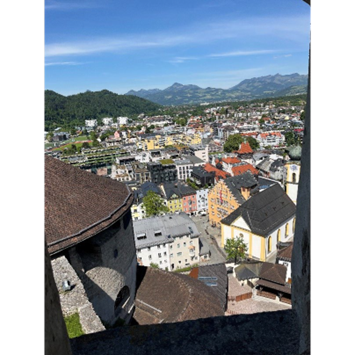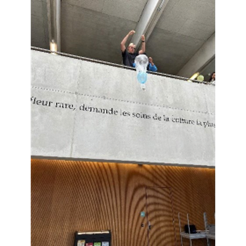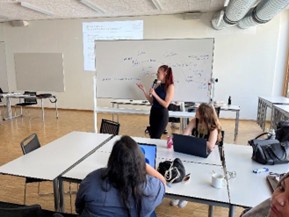Fachhochschule Kufstein Tirol proudly hosted the 8th edition of INNoCamp as a Blended Intensive Programme (BIP) for international students and academic staff in May 2025. A BIP is a short, intensive cross-border educational experience combining both online and in-person elements. Part of the new Erasmus+ programme generation (2021–2027), this format brings together diverse perspectives in a collaborative learning environment. FH Kufstein Tirol (University of Applied Sciences) is a public university based in Kufstein, in the Austrian Tyrol, founded in 1997. The university emphasizes a practical, applied approach to education, with mandatory semesters abroad for full-time undergraduate students and international study trips for graduate students (FH Kufstein Tirol 2025).
Set against the breathtaking backdrop of the Tyrolean Alps, INNoCamp Kufstein welcomed 39 students and representatives from six universities, comprising 30 different nationalities. Together with local businesses, 110 participants – including Austrian and international students, instructors, expert mentors, and members of the Kufstein business community – worked to tackle real-world challenges posed by local enterprises and public organizations.
 Picture 1: Kufstein, flourishing Tirolean city (photo: Kari Halme)
Picture 1: Kufstein, flourishing Tirolean city (photo: Kari Halme)
“INNoCamp Kufstein is now a well-known and respected event within our local business community,” shared senior lecturer Karin Steiner at the Institute for Entrepreneurship and Innovation at FH Kufstein Tirol, who has led the initiative since its inception. The Institute for Entrepreneurship and Innovation is a central unit at FH Kufstein Tirol dedicated to promoting entrepreneurial thinking and supporting founders, students and pupils in the Kufstein region(www.fh-kufstein.ac.at). Not even the global pandemic disrupted the annual tradition – Steiner successfully kept INNoCamp running during the COVID-19 years.
Through INNoCamp, Tyrolean businesses benefit from multicultural perspectives on their challenges. Multinational student teams – formed during three preparatory online sessions – were tasked with developing innovative solutions tailored to real organizational needs. These early online meetings allowed teams to familiarize themselves with the participating companies’ business models before the in-person week began.
 Picture 2: ”Save the flying egg” team excercise (photo: Kari Halme)
Picture 2: ”Save the flying egg” team excercise (photo: Kari Halme)
Team building, idea generation and competition
During the on-site intensive week, students were introduced to various innovation and development tools designed to support their creative process. The first day focused on team building through off-topic activities that fostered trust and group cohesion. In the evenings, the INNoCamp team organized cultural activities and networking opportunities, allowing participants to explore the town of Kufstein and build meaningful connections – sometimes around cozy campfires after long days of innovation.
Gradually, teams shifted their attention to their assigned challenges. On the second evening, they presented their preliminary pitches to panels of experts, who then provided individualized coaching to help refine the students’ ideas. With expert input and innovation tools in hand, teams were empowered to finalize their solutions.
 Picture 3: Prototyping an idea (photo: Kari Halme)
Picture 3: Prototyping an idea (photo: Kari Halme)
The event culminated in the INNoCamp Final Gala, where each team delivered a concise five-minute pitch in front of a jury. In total, there were 17 pitches in four challenges, from each of which a winning team was selected. The winning teams walked away with a €1,000 prize – and everyone left with invaluable experience.
Highly regarded approach to innovation and multicultural collaboration
Karin Steiner described INNoCamp 2025 as “the largest and most international edition to date.” She emphasized how the diversity of cultural backgrounds among team members led to the development of high-quality, original solutions.
Senior lecturer Petri Lintumäki from Kajaani University of Applied Sciences (KAMK), Finland, praised the event for its seamless integration of innovation learning and international networking. “I was impressed by how quickly a sense of community formed among the participants,” he noted, adding that the skills students gained are directly applicable in real- world business environments.
Dr. Tomasz Smus of Varsovia University of Applied Sciences, Warsaw, Poland, co-hosted “Rapid Prototyping” with Karin Steiner and Markus Ehrlenbach, coached the student teams on pitching strategies, focusing on how to attract investors, capture an audience’s attention, and deliver persuasive messages. He emphasized the importance of researching potential investors beforehand. He sat on the “Experts Night” team, where he had the opportunity to support teams in developing their ideas. Dr. Smus commended the organizers for successfully balancing work and leisure throughout the week and concluded that BIP Kufstein INNoCamp gives students a far more practical understanding of business than traditional lectures.
Lecturer Daiva Babilevičienė from Vilniaus Kolegija, Lithuania, viewed the Kufstein INNoCamp as part of a broader movement. She pointed out that similar innovation camps are being held across Europe, strengthening students’ capabilities to address the continent’s wider economic challenges.
According to senior lecturer Kari Halme from Laurea University of Applied Sciences, Finland, INNoCamp perfectly aligns with Laurea’s Learning by Developing pedagogical model. He praised the collaboration between FH Kufstein and local businesses in ensuring that graduates are equipped with the relevant skills and mindset to thrive in their future careers.
 Picture 4: Audience listens carefully the pitches (photo: Kari Halme)
Picture 4: Audience listens carefully the pitches (photo: Kari Halme)
Challenging and rewarding
“The social interaction was incredible,” said Pabasara Dewmini, a KAMK student. “I made more new friends in this one week than during my whole time at my home university!” She appreciated how well the workshops and lectures prepared students to address complex challenges.
First-year student Andrius Papiningas from Vilniaus Kolegija admitted feeling slightly nervous about pitching in front of a live audience but described the overall program as deeply impressive.
Denise Gruber, a student at FH Kufstein, praised the evening activities organized by the INNoCrew. which was a team of students from FH Kufstein who shared the responsibilities of organizing and executing the INNoCamp program. Denise Gruber noted that building team rapport during online sessions was somewhat challenging. She added that the public nature of the final presentation added positive pressure that enhanced multicultural collaboration.
For Omaima Arrais from the University of Almería, Spain, working in a multicultural team was a completely new experience. She was amazed by the number and variety of activities organized by the instructors and INNoCrew. “The challenge took us out of our comfort zones,” she reflected. Comparing INNoCamp with her home university experience, she found it to be “much more practical and hands-on.” She also expressed gratitude for the kindness and hospitality shown by FH Kufstein’s staff and students.
 Picture 5: Luka Khackhizede (second left), Fabain Fobeaux and Nora Lehtonen won the Tux Flinkenberg challenge and 1000€. Sophie Hemetsberger (first left) hosted. (photo: Kari Halme)
Picture 5: Luka Khackhizede (second left), Fabain Fobeaux and Nora Lehtonen won the Tux Flinkenberg challenge and 1000€. Sophie Hemetsberger (first left) hosted. (photo: Kari Halme)
“We had a great time!” said Emmi Näyhä from Laurea University of Applied Sciences. She particularly enjoyed the instructor-led social networking exercises and found them to be “extremely effective.” Emmi also valued the opportunity to deepen her understanding of intercultural communication and leadership.
In the end, both students and instructors agreed that BIP Kufstein INNoCamp 2025 was a great success, offering rich learning experiences, professional collaboration, and unforgettable moments. The Final Gala showcased not only creative and impactful ideas but also the powerful outcomes of intercultural teamwork – leaving the judges with the most difficult task of all: choosing just one winner each for the challenges from a pool of exceptional presentations.
References